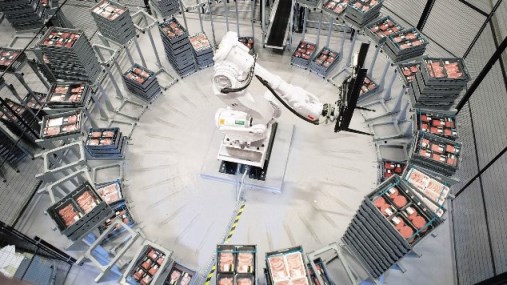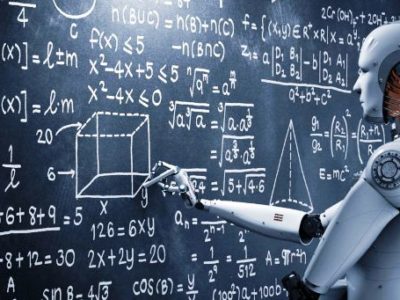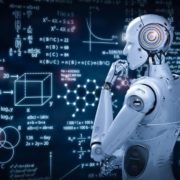By Stephen Dombroski, Director of Food and Beverage Markets, QAD
In recent years, the integration of Artificial Intelligence (AI) has transformed numerous industries, and the food and beverage manufacturing sector is no exception. AI technologies are revolutionizing the way food and beverage products are produced, improving efficiency, quality control, and overall operations. From streamlining production processes to enhancing food safety, AI is reshaping the industry and setting new standards for the future.
RELATED: Artificial Intelligence elevating eLearning as nextgen edtech spurs seismic economic shifts
AI in food and beverage manufacturing is the ability to use expert data coming from a number of different sources, either through the different AI apps or other types of data avenues, that is utilized by people throughout the entire ecosystem to make the process of manufacturing food more efficient, more cost effective, and easier and more accessible.
Every piece of data of any kind is useful in some way to every process up and downstream throughout the supply and value chains of any food and beverage manufacturer. Therefore, the value chain in food manufacturing begins with the farmers. For example, going to the furthest upstream process using the analogy of the Mississippi River, a person could easily walk across the stream of the river at its origins–the very start of the food supply chain the Mississippi River is a farmer. In order to make tomato ketchup, the very start of it is the farmer that plants tomato plants and grows those tomatoes. So AI, for the farmer could mean anything that could help that farmer get a better crop yield. However, AI helps much more in food manufacturing than sourcing. In fact, there are five areas where AI can really help the food industry:
- Supply chain optimization
Another area where AI is transforming food and beverage manufacturing is in supply chain optimization. AI algorithms can analyze complex data sets, including consumer demand, market trends, and inventory levels, to optimize production planning and inventory management. This enables manufacturers to respond more efficiently to changing market demands, reduce stock outs or overstocking, and minimize waste. AI-powered predictive analytics can forecast future demand patterns, allowing manufacturers to adjust production accordingly and optimize their resources.
Regardless if a manufacturer specializes in fresh foods, shelf stable foods, or frozen foods, the entire market begins as fresh products. Like the tomato farmer example, AI can be used to determine crop yields, optimal temperature and soil, as well as monitoring pests and relaying ideal fertilizers.
- Quality control
One of the key areas where AI is making a profound impact is in quality control and inspection. Traditionally, human inspectors have played a crucial role in ensuring that food and beverage products meet strict quality standards. However, this process is time-consuming, labor-intensive, and subject to human error. With AI, computer vision systems equipped with machine learning algorithms can accurately and rapidly inspect products, identifying defects or abnormalities that may be missed by the human eye. This technology not only improves the overall quality of products but also reduces waste and lowers costs.
Furthermore, AI is significantly enhancing food safety measures in the manufacturing process. Contamination and foodborne illnesses are major concerns in the industry. AI-powered systems can analyze vast amounts of data to identify potential risks, track ingredients and products throughout the supply chain, and detect patterns that indicate potential safety hazards. By leveraging AI, manufacturers can implement proactive measures to prevent foodborne outbreaks, leading to improved consumer trust and brand reputation.
On the factory floor, quality control can be seen in predictive maintenance. AI can be used to predict when equipment might fail or will fail, and be able to help predict better maintenance cycles, allowing manufacturers to avoid serious downtime and costly repairs.
- Inventory Management
Having the tools to be able to optimize inventory flow, minimize waste, technology to maximize the cold chain, when producing products is essential when the most valued aspect of the process is the inventory itself. Therefore with AI data intelligence, using different types of algorithms to analyze different types of issues, can help optimize inventory levels. Another utilization of AI from the inventory side is managing inventory at multiple locations to minimize the amount of redistribution of inventory that needs to be used. For example, if inventory is kept at two locations, Los Angeles and New York, and the manufacturing facility is in Chicago, AI can help with sudden changes in orders and forecast distribution demands between locations, saving tremendously on transportation costs and ensuring no inventory spoilage.
- Product development
In addition to improving operational efficiency, AI is also driving innovation in product development. Machine learning algorithms can analyze vast amounts of data, including consumer preferences, market trends, and nutritional profiles, to generate insights that inform the creation of new food and beverage products. This technology enables manufacturers to develop customized and personalized offerings that cater to specific consumer segments, enhancing customer satisfaction and market competitiveness.
Product development involves product forecasting, demand forecasting, and demand planning, all utilizing historical data. However, historical forecasts today are pretty much history, because COVID threw those algorithms out the window. Luckily, AI can be used with food manufacturers to help create new food and beverage products that are tailored to the consumers based on recent purchasing habits, which can be used through not only personal sales data, but external data as well. AI can determine if certain colors and designs in labeling are more attractive to consumers, helping with the marketing aspect of product development.
- Sustainability
Furthermore, AI is empowering manufacturers to optimize energy consumption and reduce their environmental footprint. AI algorithms can analyze energy usage patterns, optimize equipment performance, and identify areas for improvement. By implementing AI-driven energy management systems, manufacturers can achieve significant energy savings, reducing costs and contributing to sustainability initiatives. Smart labels and scanners offer consumers the opportunity to access environmental information at their fingertips at the point of purchasing, or at the point of deciding to purchase.
While AI presents numerous opportunities for the food and beverage manufacturing sector, it is important to address potential challenges. The implementation of AI technologies requires skilled professionals who can develop, maintain, and fine-tune AI systems. Additionally, data privacy and security concerns must be carefully addressed to ensure the protection of sensitive information throughout the manufacturing process.
Ultimately, AI is reshaping the landscape of food and beverage manufacturing. From quality control and food safety to supply chain optimization and product development, AI technologies offer unprecedented opportunities for efficiency, innovation, and sustainability. Embracing AI not only enhances operational performance but also positions manufacturers at the forefront of an evolving industry. As AI continues to advance, its impact on the food and beverage manufacturing sector will undoubtedly be transformative, paving the way for a more intelligent, efficient, and sustainable future.
COVER PHOTO: ABB





























